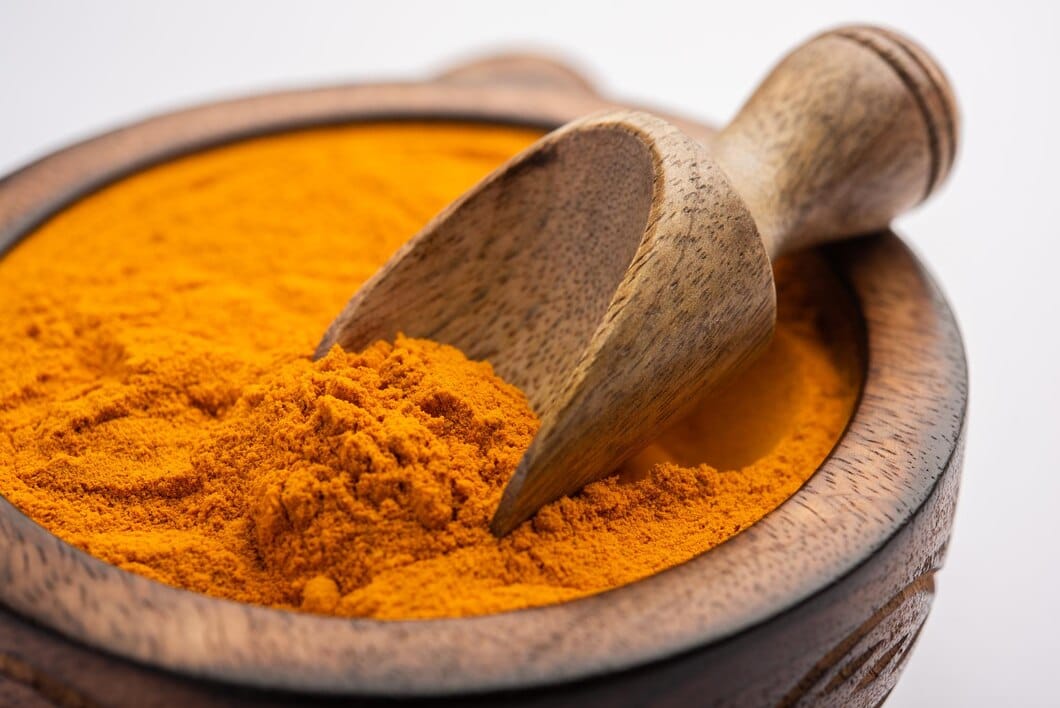Introduction
Turmeric is a brightly-coloured spice with a slightly peppery taste, native to South-East Asia and highly prized in Indian cuisine. But as well as being used in cooking, turmeric is also used as a dietary supplement for its many health benefits. In this article, we'll find out more about the origin of turmeric, its benefits for the body and how to use it as a dietary supplement to reap all its benefits.
Origin of turmeric
Turmeric, also known as turmeric, comes from the root of a plant called Curcuma longa. This plant belongs to the Zingiberaceae family, which also includes ginger and cardamom. Originally from India, turmeric is now mainly grown in South-East Asia, in countries such as India, Indonesia, Malaysia and China.
Turmeric was discovered over 4,000 years ago in India, where it has been considered a sacred plant for several millennia. It began to be used in traditional Indian medicine, Ayurveda, for its many health benefits. Today, turmeric is also used in traditional Chinese medicine and in many other countries for its therapeutic properties.
Health benefits of turmeric
Turmeric has many beneficial properties for our health. This spice is rich in curcumin, a compound with antioxidant and anti-inflammatory properties. Here are just some of the benefits of turmeric for our bodies:
Anti-inflammatory and analgesic
The curcumin present in turmeric has powerful anti-inflammatory properties, which can help relieve joint and muscle pain. Several studies have shown that consuming turmeric or curcumin-based supplements can be effective in reducing pain associated with osteoarthritis, rheumatoid arthritis and irritable bowel syndrome.
Antioxidant
Curcumin is also a natural antioxidant that helps protect our bodies from damage caused by free radicals. Free radicals can lead to chronic illnesses such as cancer, cardiovascular disease and premature ageing. Regular consumption of turmeric can help prevent these diseases and maintain good overall health.
Improved digestion
Turmeric is also known for its carminative properties, meaning it helps relieve bloating and stomach cramps. It also stimulates the production of bile by the liver, which promotes better digestion of food and can help relieve symptoms associated with digestive disorders such as irritable bowel syndrome.
Effects on the brain and nervous system
The curcumin present in turmeric can also cross the blood-brain barrier, with beneficial effects on the brain. It can therefore help protect brain cells, improve memory and concentration, and relieve the symptoms of certain neurodegenerative diseases such as Alzheimer's or Parkinson's.
Use as a food supplement
To enjoy the health benefits of turmeric, it is advisable to consume it in the form of a dietary supplement. There are many turmeric-based products on the market, including capsules, tablets, powders and infusions. Before choosing a turmeric-based dietary supplement, it's important to check its quality and origin so that you can reap all its benefits.
Dosage
According to studies, it is advisable to consume between 500 and 2000 mg of turmeric a day to reap its full benefits. However, it is important to follow the recommended dosage indicated on the chosen product and to seek the advice of a health professional if you are currently taking medication.
Combination with other ingredients
Turmeric can be combined with other ingredients to optimise its effects on the body. For example, it is often combined with black pepper, which contains piperine, to increase the bioavailability of curcumin in the body. It can also be combined with ginger for its anti-inflammatory and digestive properties, or with green tea for its antioxidant effects.
Precautions for use
Although turmeric is considered safe, it is important to take a few precautions when consuming it as a dietary supplement. In particular, pregnant and breast-feeding women and people suffering from gallstones are advised not to take turmeric as a dietary supplement.
It is also important to check the quality and origin of the turmeric to avoid any possible contamination by toxic metals such as lead or arsenic. If in doubt, it's best to turn to organic products or seek the advice of a health professional.
Conclusion
Turmeric is not only a tasty spice, but also a dietary supplement with numerous health benefits. Thanks to its anti-inflammatory, antioxidant and digestive properties, it can help prevent and relieve many chronic illnesses. However, it is important to check the quality and origin of the product before taking it as a dietary supplement, and to follow the recommended dosage. By adding turmeric to our diet, we can benefit from its health-giving properties in a natural and effective way.
Sources:
- Anti-inflammatory effects of turmeric - scientific study
- Antioxidant effects of turmeric - scientific study
- Effects of turmeric on digestion and intestinal flora - scientific study
- Effects of curcumin on the brain and nervous system - scientific study
- Properties of turmeric as a dietary supplement - scientific study











